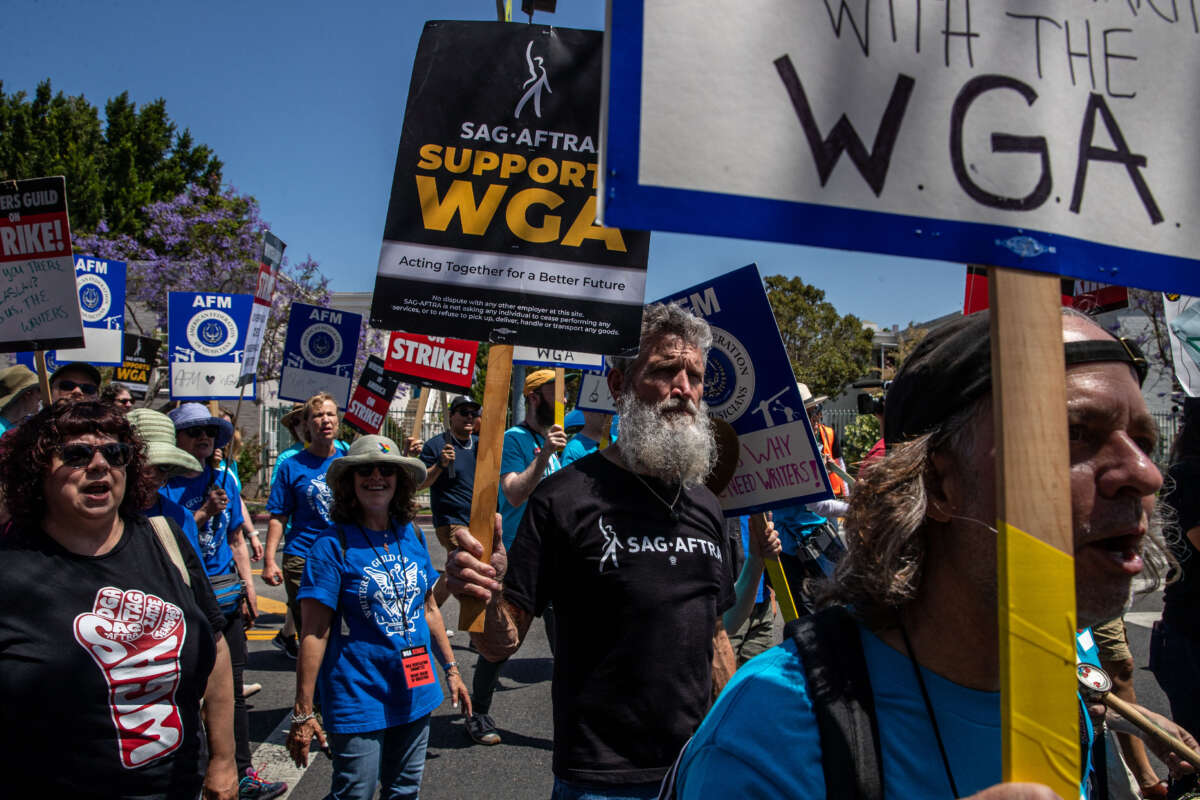Truthout is an indispensable resource for activists, movement leaders and workers everywhere. Please make this work possible with a quick donation.
A union representing 160,000 actors is slated to go on strike on Thursday, setting up a historic strike involving both actors and screenwriters that would effectively shut down the film and TV industry for the first time in 63 years.
The bargaining agreement between the actors’ union, Screen Actors Guild-American Federation of Television and Radio Artists (SAG-AFTRA), and major studios and streamers like Amazon, Disney, Netflix and Warner Bros. Discovery expired on Wednesday night, with the parties failing to reach an agreement after over a month of negotiations.
The union’s board announced on Thursday afternoon that it has voted unanimously to authorize the strike. Members of the guild voted 98 percent in favor of a strike last month.
“They have left us with no alternative,” Duncan Crabtree-Ireland, the union’s lead organizer, said in a press conference.
“I am shocked by the way the people that the people we have been in business with are treating us. I cannot believe it, quite frankly, how far apart we are on so many things. How they plead poverty, that they’re losing money left and right, when giving hundreds of millions of dollars to their CEOs,” said SAG-AFTRA President Fran Drescher in a fiery speech on Thursday. “It is disgusting. Shame on them. They stand on the wrong side of history.”
“You cannot change the business model as much as it has changed and not expect the contract to change, too,” Drescher continued, referring to the upheaval of the industry in recent years due to the rise of streaming services. “We demand respect, and to be honored for our contribution. You share the wealth, because you cannot exist without us.”
AMPTP has said that it was “deeply disappointed” in SAG-AFTRA’s decision to strike. The decision comes weeks after the Directors Guild of America, the third largest union of creatives in Hollywood, ratified a deal with AMPTP.
For the first time since 1960, the actors will join the picket line with over 11,000 members of the Writers Guild of America (WGA), who have been on strike for three months due to concerns over wages, residuals, staffing, and growing concerns that studios will use artificial intelligence to put writers out of work; the 1960 strike lasted five months and led to the creation of the residual payment system for writers.
SAG-AFTRA has raised similar issues to the writers, with concerns on compensation and artificial intelligence. Though the union does represent a number of prominent actors, like Meryl Streep, Quinta Brunson, Jennifer Lawrence and Ben Stiller, it also represents a large number of lesser-known actors who do not necessarily enjoy the same wealth that the most famous celebrities are known for.
“We’re looking to make sure that acting can be a sustainable career choice for people, not just the 100 most famous celebrities in the world, but for the whole large population of our membership,” Crabtree-Ireland told The New York Times. “They should be able to make a living and you know, pay a mortgage or pay rent like everybody else.”
The SAG-AFTRA strike will put even more pressure on AMPTP to reach an agreement with the actors and the writers — though, so far in the WGA strike, the studios appear to be digging down on refusing to bargain.
According to a Deadline report this week, industry insiders say that studio executives are planning to stall negotiations until at least the fall “to allow things to drag on until union members start losing their apartments and losing their houses,” said one anonymous studio executive — perhaps one of the many who are paid tens of millions or even hundreds of millions of dollars a year. Another source told the publication that this tactic is “a cruel but necessary evil.”
A terrifying moment. We appeal for your support.
In the last weeks, we have witnessed an authoritarian assault on communities in Minnesota and across the nation.
The need for truthful, grassroots reporting is urgent at this cataclysmic historical moment. Yet, Trump-aligned billionaires and other allies have taken over many legacy media outlets — the culmination of a decades-long campaign to place control of the narrative into the hands of the political right.
We refuse to let Trump’s blatant propaganda machine go unchecked. Untethered to corporate ownership or advertisers, Truthout remains fearless in our reporting and our determination to use journalism as a tool for justice.
But we need your help just to fund our basic expenses. Over 80 percent of Truthout’s funding comes from small individual donations from our community of readers, and over a third of our total budget is supported by recurring monthly donors.
Truthout has launched a fundraiser to add 310 new monthly donors in the next 4 days. Whether you can make a small monthly donation or a larger one-time gift, Truthout only works with your support.
